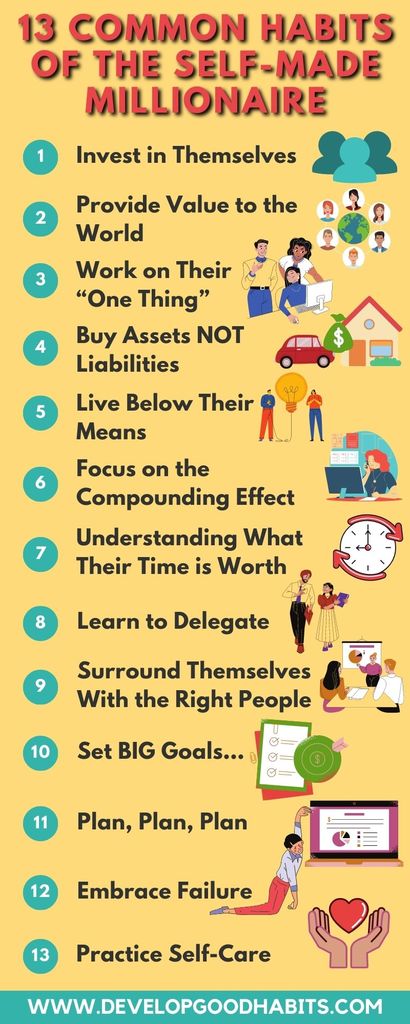Think for a second about why you’re here reading this site, Develop Good Habits.
Hopefully by now it’s because you recognize that it’s the small things that you do every day that add up to create who you are and where you’re heading in life. By developing good habits, you can ensure a good long-term outcome by setting yourself up for success.
If you save a dollar a day, you will have $365 extra dollars at the end of the year. If you buy a coffee at the cafe each morning, you may find yourself with $2,300 fewer dollars at the end of the year. Your daily actions add up.
People have researched the habits of self-made millionaires to uncover the little things that they have consistently done that have led them to success. And in this article, we are going to look at 13 habits of self-made millionaires that we have gathered from our own research and experience to share with you.
Let’s get started.
1. Invest in Themselves
First thing’s first, you have to gain the knowledge, education, and experience to be able to add something valuable to the world.
Investing in yourself by acquiring new skills will pay the most dividends in the end because your knowledge and skills will stay with you, no matter what the state of the economy is.
We are seeing “credential inflation” these days where a master’s is the new bachelor’s, and simply graduating from college isn’t perceived as being the accomplishment that it once was.
And, as time goes on, you can lose your employability or “competitive edge” over other job applicants as your skills become obsolete, so continuing to invest in yourself is critical.
By updating and diversifying your skills and learning multiple ways of doing things, you will increase your earning potential.
With a diversified skill set, you can apply your knowledge to other profitable business ventures if an opportunity fails–and you don’t have to crash every time the economy does. So invest in yourself through education, getting a mentor, and staying up-to-date with emerging trends in your industry.
In a bit, we will talk about the importance of investing your time in a way that can best serve your long-term needs.
Before we proceed, if you're someone who prefers to watch instead of read, here's the video version of this article:
2. Provide Value to the World
Once you’ve invested in yourself, you need to pass that investment on to provide people with something that’s valuable.
The fundamental part of building success is being able to provide financial, social, or another type of value to others. If you don’t have anything to offer that people want to buy, you won’t be able to make any money.
Being a person of value is the only way your success will be sustainable because it puts you in the driver’s seat and prevents you from having to rely on someone else’s continued success.
It allows you to control the directions that you choose to go in and make your own decisions rather than being at someone else’s mercy.
Learn a skill that’s in high demand or build a business that meets an unmet need of people that you know will be of value. Your quality of life is impacted by your feelings of self-worth and competence, which in turn is proportional to the amount of value you add to the world.
The value that you provide to the world will, in turn, make you valuable.
3. Work on Their “One Thing”
In their book, The One Thing, Gary Keller and Jay Papasan pose a question that you should ask yourself every day: “What’s the one thing you can do, such that by doing it, everything else will be easier or unnecessary?”
By asking this question, you’ll identify your primary goal, and subsequently, your most important habit. Once you know your one thing, you can let go of trivial tasks and focus 100% on the things that are already helping you progress.
By working on your one thing every day, you’ll be working smarter, not harder.
For example, if you want to become a writer, block out a period of time in your day (and commit to it like you would any other appointment) and write at least 1,000 words.
The easiest way to succeed with whatever your one thing is is to integrate it with your daily routine. Remove any potential distractions during this time (such as technology) and put all of your energy toward whatever you’ve identified to be your one thing.
4. Buy Assets NOT Liabilities
If you’re a homeowner, do you consider the equity you have in your home to be an asset or a liability? What if your home is completely paid off?
While you may think this is an asset–and it kind of is– it’s really more of a liability because it takes money out of your pocket (homeowner’s insurance, home repairs, taxes, etc.) without putting any money back in.
The truth is, unless you live in an area that is experiencing significant housing appreciation, your home’s value will only increase along with inflation (which has been pretty low lately).
Now, if you own rental property, this could be considered to be an asset if you’re taking in more money than you’re spending, but paying for your primary residence will always cost money and will therefore always be a liability.
So how can an asset also be a liability? People typically spend most of their money on food, transportation, and shelter, which are all liabilities in disguise. And, while you can’t not buy these things, you can reduce your spending on them.
When it comes to buying assets, you have to buy them at a fair price and hope the demand for the product increases in the future.
Some good assets to invest in include:
5. Live Below Their Means
Speaking of reducing spending on necessities, self-made millionaires are aware of the hedonic treadmill metaphor, which prompts them to think twice before spending their money.
The idea here is that despite how something makes you feel in the moment, you will eventually return to your original emotional state.
Can you think of a purchase you have made in your life that completely and permanently greatly improved your emotional wellbeing?
I would be willing to bet not.
Once you have something that you’ve had your eye on, you’re probably thrilled…for a while. However, after it becomes something you use on a regular basis, you lose that huge sense of appreciation for it.
And, once the item becomes less enjoyable, it turns into a need instead of a want. You return to your baseline of happiness after getting used to and adapting your life to whatever it is that you once wanted so badly.
So if you think your life will greatly improve if you buy a large house or have the most expensive car, remember that you have a predisposition to a set point of happiness, which won’t be impacted by the merchandise (or liabilities) that you buy.
6. Focus on the Compounding Effect
There are two ways in which the compounding effect can influence your financial wellbeing:
Compounding Interest
When it comes to finances, compound interest is the interest you earn on your investments, plus the interest you’ve earned on your interest. It's basically your money growing itself, and is one of the best ways for you to make your money build over time.
People who are able to obtain great wealth are very deliberate when it comes to allocating their money and they strategically invest their earnings by adding to index funds on a continuous basis and then letting them grow.
Fidelity Investments conducted a survey that found the top sources of assets for self-made millionaires include things that they invest their money in, capital appreciation, and employee stock options.

By making income-generating investments, you will slowly (but steadily) become financially independent and stable. What’s more, you’ll safeguard your future by securing your financial wellbeing for your retirement years.
Compounding Habits
Those who are truly successful are able to identify their most important habits and do them every day.
Nothing that is easily and immediately acquired is sustainable, and if you want to make a lasting impact on your life, you have to have the patience and put in the work that is required.
Your small, everyday habits add up to create who you are today and who you will be down the road.
Think about it, you can’t eat unhealthy food for a year as a phase, expecting your perfect health to return as soon as you trade your burger for a salad. You will suffer the consequences of those decisions for long after that year is up.
Whatever small actions you take that inch you closer to achieving your dreams need to be done every single day. You can’t occasionally put $100 in the bank and expect to become rich. You need to stick to your positive habits so they will build upon each other.
Now, these habits may be so small that they only take five minutes out of your day, but they have a powerful compounding effect that is much greater than the sum of its parts.
7. Understanding What Their Time is Worth
Your time is another important asset that holds a huge amount of value. Everyone has the same amount of time each day, and you can’t buy any more of it. But, you can invest in your time by spending it wisely.
So how do you know when spending your money is in your better interest than spending your time?
For example, you may consider having a house cleaning service to be a luxury. But if you think about it, would it be worth it to you to pay someone else to clean your house if that gave you three extra hours on the weekend to do something that would have a greater impact on your long term goals?
You have to calculate what your time is worth in order to be able to make informed decisions about how you spend your money vs. how you spend your time.

To come up with a quick estimate, write down the amount of time you spend earning money (i.e. the amount of time you spend at work, travelling to work, answering emails when you’re off work, driving your kids to daycare so you can work, etc.) and the amount of money you earn.
Then divide the amount of money you earned by the time you spent earning it. So, if you make $62,455 per year (which was the median income for men in 2014 in the US), that means your time is worth just under $25/hour (assuming you work a 40-hour work week and spend an hour commuting each day).
Once you have this information (and you can learn more about making your calculation here), you can make better everyday decisions.
For example, if you calculate your time to be worth $25/hour, you shouldn’t waste your time sitting through a 30-minute presentation to earn a $10 gift card. Break down your daily activities into hourly rates of pay and make sure that everything you do is worth your time.
8. Learn to Delegate
Once you know what you time is worth, you can delegate or outsource any task that ends up costing you more to do yourself than it would to hire someone else to do.
For example, if you pay $60 a week for someone to clean your house for 3 hours and your time is worth $25/hour, you shouldn’t consider the service to be such a luxury anymore. Instead, it’s an investment in the sense that you can spend that time doing other things that will have a greater impact on your bottom line.
You can use the Eisenhower Matrix to figure out what tasks you can best delegate to others, and which things you should prioritize spending time on yourself.
9. Surround Themselves With the Right People
We have talked about the fact that you are essentially the average of the five people you spend the most time with.
So if you really want to better yourself, you should aim to be the dumbest person in the room so you can learn from those around you.
However, there is another argument for being the dumbest person in the room. Let’s say a business is all set to release a long-anticipated, complex project. No seasoned executive is going to speak up in the final planning session and ask the team if following through with the project is even worth it.
Everyone has already accepted the project for what it is and the plan has already been set in motion. Such a naïve question would not only seem extremely late to ask, it would also sound pretty dumb.
However, basic questions such as this one can potentially be transformational if people stepped back to reflect on the principles of their organization and its situation when making important decisions instead of rushing to get things started.
By going back to the basics, you can ensure that you’re always making decisions that will be beneficial in the long-run.
10. Set BIG Goals…
… but work on completing them in daily, weekly, monthly, and quarterly milestones. Plans that are truly realistic and workable are completed in bite-sized chunks. Self-made millionaires take small, actionable steps–one at a time–toward their big goals.
Working toward big financial goals can help determine your fiscal future by directing your actions today. For example, let’s say you want to pay off your car loan.
This may influence your decision to go out to lunch with coworkers every day so you can use that money instead to make extra car payments. Without creating that large goal, you’re likely to maintain any poor spending habits as your debt piles up.
It’s best to make big financial goals that steadily increase your net worth every year.

Patience is key, and it’s best to think in habitual ways to grow your wealth. As a result of this, once you pass the million-dollar mark in your bank account, it probably won’t cross your mind to change your daily financial habits.
11. Plan, Plan, Plan
Self-made millionaires have a vision for their future self, and create a plan to make that vision a reality. They take the time to script their ideal future life by imagining their dreams coming true, and then they put pen to paper and map out a plan to get there.
Scott Hedgcock, a financial planner, reports that the biggest difference he has seen between people heading toward financial success and those headed toward living a life of pipe dreams is the amount of time and effort they put into creating their financial plan.
He claims that one thing that all financially successful people have in common is that they make a detailed plan and follow through with it.
Without a plan, it’s easy to make poor decisions just this once. Here are some benefits to having a good financial plan:
For visual planners, here are some vision board examples for financial freedom that you can refer to.
12. Embrace Failure
The idea of embracing your mistakes so you can learn from them can be a tough one to swallow. No one feels especially happy when they realize they’ve messed up.
But in order to be successful, you have to adapt to changing social and economic circumstances by trying new things–which inevitably invites failure along the way.
But being successful means you’re able to rethink your approach when needed–even if what you do has worked well for you in the past.
It’s important to be perceptive as you look around for new opportunities, and be willing to adjust with any market changes.
There’s no doubt that revising your trusted strategies without knowing exactly what might happen can definitely be hard–but those who don’t take these chances and remain stuck in their ways become obsolete and whatever they have to offer loses its value.
You can expect to make mistakes as you explore new territory, but it’s important to remember that failure offers a great opportunity to learn, and true failure only comes from failing to try.
13. Practice Self-Care
Self-made millionaires know the value of personal preservation and taking care of themselves.
The importance of the basics is not overlooked– a comfortable bed to get a good night’s sleep in, healthy relationships, food that properly fuels the body, and an active lifestyle are all things that wealthy people prioritize on their way to the top.
Spending your life focusing on being successful and achieving your goals has one potential consequence: burnout. Self-made millionaires make sure to take time outs from their busy schedules to give themselves the break that they need to stay motivated and successful.
In our competitive, hurried society, many professionals are turned off by the idea of slowing down. However, maintaining proper health, focusing only on high-value tasks, getting sufficient rest, and building meaningful social connections are all critical elements to being financially successful.
Final Thoughts on Habits of Self-Made Millionaires
The first step to becoming a self-made millionaire is to accept complete responsibility for your financial decisions.
Without setting financial goals and simply trusting luck or assuming someone else will swoop in to take care of you will leave you to eventually worry about money.
By taking control and recognizing you have the ability to make more money, you won’t see yourself as a passive victim of a failing economy. You will be an active agent in making your own living instead of waiting for things to happen.
These success habits will help you increase your income and become a self-made millionaire in the modern working world.
And to help you create goals and track your progress, here are some templates:
- 11 Free Printable Daily Planner Templates
- 35 Free Weekly Planner Template Printables
- 11 Printable Monthly Goals Templates & Worksheets
Finally, if you need help with building habits, then check out this nine-step blueprint that walks you through the entire process of creating lifelong habits.)

Connie Mathers is a professional editor and freelance writer. She holds a Bachelor's Degree in Marketing and a Master’s Degree in Social Work. When she is not writing, Connie is either spending time with her daughter and two dogs, running, or working at her full-time job as a social worker in Richmond, VA.


